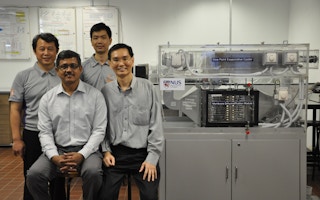Recycling old cell phones, laptops, and other electronic waste (e-waste) in Singapore will now be easier, thanks to a new programme by global courier company DHL Express, telecommunications provider StarHub, and e-waste recycler TES-AMM which will see 100 e-waste bins installed across the island by year end.
To continue reading, subscribe to Eco‑Business.
There's something for everyone. We offer a range of subscription plans.
- Access our stories and receive our Insights Weekly newsletter with the free EB Member plan.
- Unlock unlimited access to our content and archive with EB Circle.
- Publish your content with EB Premium.
The three companies signed a Memorandum of Understanding (MOU) at Singapore’s Environment Building on Tuesday to launch the ‘Recycling Nation’s Electronic Waste (RENEW) programme.
This is an expanded version of StarHub’s E-Waste Recycling Programme which began in 2012, and in partnership with TES-AMM, collected and processed e-waste from 30 bins islandwide.
The National Environment Agency estimates that Singapore produces 60,000 tonnes of e-waste annually, equivalent to the weight of 172 MRT trains. Half of this comes from consumers, and half from the industry sector.
StarHub and TES-AMM’s programme, which was first launched during Earth Hour 2012 with five collection bins located in StarHub shops, collected more than one tonne of e-waste in its first three months. The programme was later expanded to place 30 bins in schools, residences, offices and community centres island wide, with a corresponding increase in the volume of e-waste collected.
“
It is crazy to mine gold, silver and precious metals from the earth and then dump them. Urban mining is a business idea whose time may not have come yet, but it will come eventually.”
Vivian Balakrishnan, Minister for the Environment and Water Resources
In 2013, 6,500 kilograms of e-waste were collected; the figure for 2014 stands at 5,600 kilograms to date.
However, this figure is still a small part of the overall e-waste stream. Scott Mac Meekin, TES-AMM’s chief operating officer, said that only 15 per cent of consumer and household e-waste makes it into a responsible recycling stream, and that the RENEW programme aims to raise this figure.
Under the new initiative, StarHub will provide the collection bins and new project partner DHL Express will transport the collected waste to TES-AMM’s e-waste recycling plant in Singapore’s Benoi industrial district on a pro-bono basis.
The programme is a voluntary effort by all three companies, who did not disclose their expenditure in supporting this initiative. It aims to have hundreds of bins installed at educational institutions, malls, government offices, office buildings, and community clubs over the next two to three years.
StarHub’s chief executive Tan Tong Hai said that while there was some awareness of the company’s e-waste recycling programme, “for a truly impactful change, a larger bin network is needed”.
Herbert Vongpusanachai, senior vice president and managing director of DHL Express, said that sustainability is a key pillar of DHL’s long-term business vision.
“This e-waste recycling programme is a great programme that requires logistical support. Having a logistics partner such as DHL to collect the e-waste means the programme can support more bins across the island and make e-waste recycling an even more accessible option,” he said.
“The concept of “reduce” is not one that is gaining ground in the technology sphere”, said Meekin, adding that e-waste is one of the world’s fastest growing toxic waste streams.
The e-waste that is delivered to TES-AMM by DHL is separated into viable products that can be refurbished and resold after being put through stringent data wiping processes, and those that are recycled so that reusable materials such as plastic, copper, and gold can be recovered.
Meekin added that increased access to e-waste recycling bins under the RENEW programme would give consumers “the peace of mind that the most advanced and efficient methods have been applied to extract every bit of reusable material first and then to neutralise the toxicity of the remaining material”.
Singapore’s Minister for the Environment and Water Resources Vivian Balakrishnan, who was the guest of honour at the MOU signing ceremony, praised the initiative, saying that ‘urban mining’, or the process of recovering metals and rare minerals from electronic waste was an idea that was ahead of its time.
“It is crazy to mine gold, silver and precious metals from the earth and then dump them,” he said. “Urban mining is a business idea whose time may not have come yet, but it will come eventually.”
Balakrishnan added that currently, urban mining was held back by the lack of economic incentives for consumers to recycle their e-waste and the shortage of cost-effective logistic solutions to collect and transport e-waste to recovery facilities.
While the voluntary efforts by the companies behind the RENEW initiative were laudable, Balakrishnan added that the litmus test for the success of e-waste recycling and urban mining was whether companies could do this as a profitable enterprise rather than a corporate social responsibility effort.
This is a goal that is made difficult by the fact that as technologies advance, the quantity of precious metals being used in electronic devices is shrinking, said Meekin. This in turn leads to low levels of material recovery during the recycling process.
To offset this, more of the e-waste stream needed to be diverted for recycling, said Meekin. “It makes a big difference when the volume of recyclable e-waste increases.”
“It really comes down to educating consumers about their personal responsibility to discard their devices in a responsible manner,” he added.
On their part, StarHub runs an education programme on e-waste recycling in schools, and uses their TV channels in their network to disseminate sustainability messages.
“We want to go beyond just providing the physical bins to educating the public on these issues,” said Tan.
“Through our educational initiatives, we hope that younger and current generations will embrace these e-waste recycling efforts,” he added.








